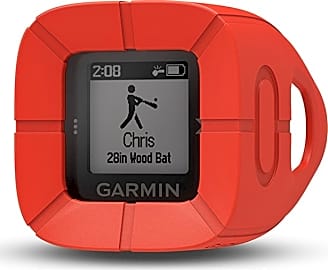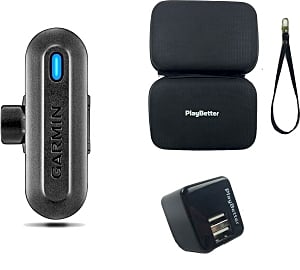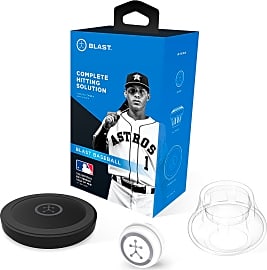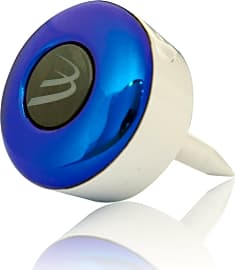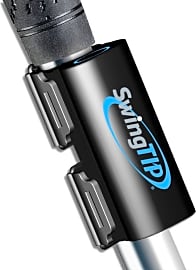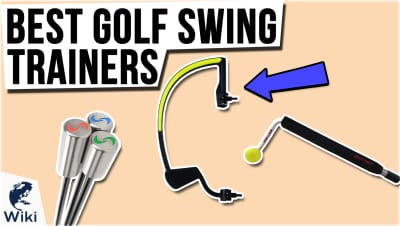The 8 Best Swing Analyzers

This wiki has been updated 39 times since it was first published in September of 2015. If you're trying to take your game to the next level, whether that game is golf, baseball, or softball, one of these swing analyzers will give you all the data you need to rectify weak points. By giving you statistics on your club or bat speed, trajectory, and angle of impact, you can quickly and easily focus on areas that need improvement, without having to pay for expensive coaching lessons. When users buy our independently chosen editorial picks, we may earn commissions to help fund the Wiki.
Editor's Notes
May 21, 2019:
Whether you are trying to improve your baseball or golf swing, one of these swing analyzers can help. Depending on which model you choose, it may attach to your glove, or the bat or club. Each of these options has its pros and cons. For example, items like the Zepp Golf 2, which attaches to your glove, allow you to quickly switch between clubs without having to constantly remove and mount the device. On the other hand, models like the Caddie Elite and Garmin TruSwing, which attach directly to the club, or the Garmin Impact Baseball Sensor and Blast Baseball 900, which attach to a bat, may have a slight edge on accuracy, though some may find them slightly obtrusive on their club or bat. The Rapsodo R-Motion is a nice choice that deserves special mention. When paired with a net and mat, it allows you to play indoors and even simulates 15 real courses. For the most unobtrusive club-mounted options, we recommend choosing one that attaches to the butt, rather than the shaft, such as the Caddie Elite or 3Bays GSA Zone.
Who Needs A Swing Analyzer?
A good swing analyzer gets all of these questions out of your head and answers them for you - allowing you to just focus on making a solid swing.
Professionals in every athletic field become professionals through constant effort and a dedicated practice to improving their game. In sports like golf, softball, tennis and baseball, this means improving your swing.
While many swing analyzers can be used for multiple sports, a large part of the market is made up of the average weekend golfer looking for a competitive edge over their workmates. And every one of those average golfers has an experience like this: You are at the driving range, going through your routine. All of a sudden, you hit a pristine shot. Your driver makes perfect contact. The ball has amazing loft, gently lands 300 yards away from you, and then rolls another 10 yards. Then what happens when you try to do it again? You hit down on the ball, and it skips along the ground and sputters to a stop 100 yards away. Wouldn’t it be great to know why these things are happening? If you can relate to this, you are not alone.
In reality, there are so many variables you may be thinking about every time you take a swing: Are my hands lined up properly? How are my feet in relation to the ball? Is this the right club? Did I rotate my hips enough? How can I get more power in my golf swing? A good swing analyzer gets all of these questions out of your head and answers them for you - allowing you to just focus on making a solid swing. Anyone who would like to improve their swing and figure out exactly what works and what doesn’t will benefit from a swing analyzer.
How Do Swing Analyzers Work?
The various swing analyzers on the market today can help you monitor multiple aspects of your swing. Most swing analyzers are fitted with accelerometers that can measure movement and momentum on many different planes based on the movement of the unit itself.
Using this information, swing analyzers can determine a great number of key swing statistics. Metrics like the tempo and speed of your swing are almost a given with any good analyzer. But even the simplest analyzers have the ability to track very specific statistics. Things like attack angle, swing path measurements, club angles, and hip rotation can all be determined and tracked with some of the simplest swing analyzers.
As the tools get more complex, so do the tracked metrics of your shot. Some of the most complex swing analyzers include full body scanners and sophisticated radar sensors. These types of swing analyzers will catch every nuance of your swing.
Things To Consider When Buying A Swing Analyzer
When you are considering which swing analyzer to buy, it can seem like a bit of a rabbit hole. There are swing analyzers for every skill level, and between them, every trackable statistic of a swing is covered. So you need to ask yourself what your intention is with this product. Do you want to become a world ranked golfer? Or are you happy to just play on the weekends as a way to extend your life and burn some calories?
Understanding where your needs lie can ensure you get the most out of your swing analyzer.
For the Sunday golfer looking to simply increase bragging rights around the water cooler on a Monday morning, there are many simple, easy-to-use swing analyzers. They stick to the basic swing metrics like swing angles, clubface speed, and putter stability, yet will still help you improve your game tremendously. These entry-level swing analyzers also tend to provide a lot of instruction on improving your swing. That puts them at a huge advantage for beginners and weekenders alike.
A bogey golfer or hobbyist may look for a swing analyzer which uses full body scanners and radar to track even more key metrics of their swing. Analyzers can use radar to track the distance, angle, loft, and velocity of a ball once it is struck. The advanced technology of these types of swing analyzers can also determine things like face angle, club path, tempo, and release. If these terms are alien to you, and you wouldn’t know how to fix them in practice, you would want to stick to a swing analyzer with more instruction when starting out.
Serious amateurs and professional tour golfers will tend to go for the complete package swing analyzers. These are usually pop up rooms that include a virtual screen, projector, scanner, and even a fake patch of grass with sensors in it. These analyzers not only track every imaginable aspect of your shot, they project that shot onto your favorite courses in the world and allow you to play 18 holes from the comfort of your air conditioned house.
For a weekend player, devoting an extra room in their house for a full size golf simulator and swing analyzer might be overdoing it. For a professional player, it is almost a requirement. Understanding where your needs lie can ensure you get the most out of your swing analyzer.



